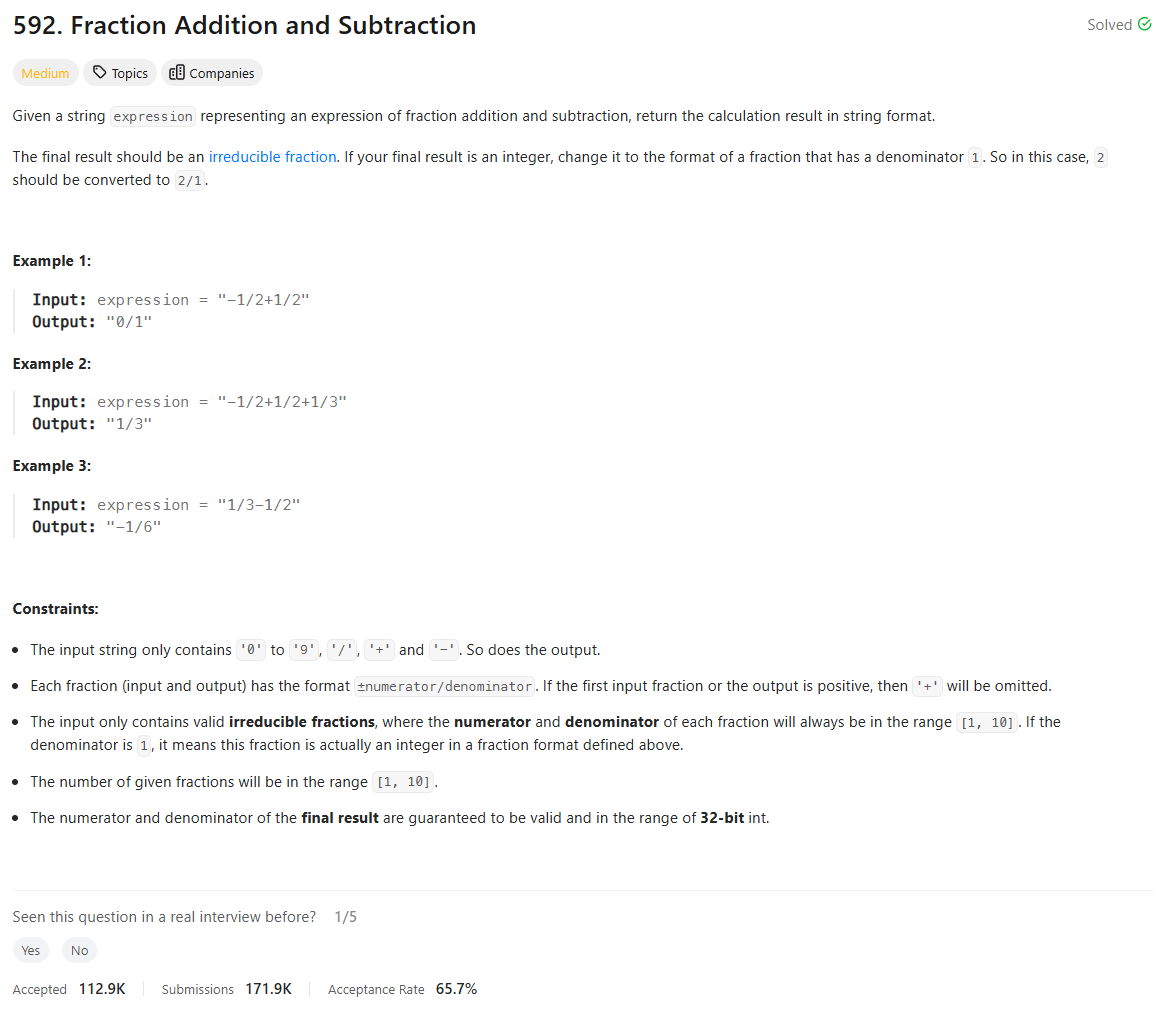Problem of The Day: Fraction Addition and Subtraction
Problem Statement

Intuition
When I first approached this problem, I immediately thought about the challenge of adding multiple fractions. My initial thought was that I needed to find a common denominator, sum up the numerators, and then simplify the result. This seemed like the most straightforward way to tackle the problem, so I decided to break down the expression into individual fractions and process each one.
Approach
To solve this problem, I took the following steps:
- Split the Expression: I split the input expression into individual fractions. I used the
replacemethod to handle both positive and negative fractions by converting any ‘-‘ signs into ‘+-‘ to preserve the correct signs. - Common Denominator Calculation: I calculated the common denominator by multiplying the denominators of all the fractions.
- Summing Numerators: I adjusted the numerators according to the common denominator and summed them up.
- Simplification: Finally, I simplified the resulting fraction by dividing both the numerator and denominator by their greatest common divisor (GCD).
Complexity
- Time complexity: The time complexity is mainly driven by the operations to compute the least common denominator and sum the numerators. In the worst-case scenario, this could be approximately \(O(n \cdot m)\), where
nis the number of fractions andmis the average length of the denominators. - Space complexity: The space complexity would be \(O(n)\) because I need to store the numerators and denominators separately before processing them.
Code
class Solution:
def fractionAddition(self, expression: str) -> str:
# Replace '-' with '+-' to manage negative fractions and split the expression
exprs = expression.replace('-', '+-').split('+')
res = 0
numerators = []
denominators = []
# Extract numerators and denominators from each term
for term in exprs:
if term == '':
continue
n, d = term.split('/')
numerators.append(int(n))
denominators.append(int(d))
# Calculate the common denominator
denominator = 1
for x in denominators:
denominator *= x
# Adjust numerators and sum them up
numerator = 0
for i in range(len(numerators)):
numerator += (numerators[i] * denominator // denominators[i])
# Simplify the fraction by dividing both numerator and denominator by their GCD
for d in [2,3,5,7,9]:
while (numerator % d == 0 and denominator % d == 0) and d != 1:
numerator //= d
denominator //= d
# Return the final fraction as a string
return str(numerator) + '/' + str(denominator)
Improved Code
class Solution:
def fractionAddition(self, expression: str) -> str:
# Replace '-' with '+-' to manage negative fractions and split the expression
exprs = expression.replace('-', '+-').split('+')
res = 0
numerators = []
denominators = []
# Extract numerators and denominators from each term
for term in exprs:
if term == '':
continue
n, d = term.split('/')
numerators.append(int(n))
denominators.append(int(d))
# Calculate the common denominator
denominator = 1
for x in denominators:
denominator *= x
# Adjust numerators and sum them up
numerator = 0
for i in range(len(numerators)):
numerator += (numerators[i] * denominator // denominators[i])
# Simplify the fraction by dividing both numerator and denominator by their GCD
for d in [2,3,5,7,9]:
while (numerator % d == 0 and denominator % d == 0) and d != 1:
numerator //= d
denominator //= d
# Return the final fraction as a string
return str(numerator) + '/' + str(denominator)
Editorial
Approach 1: Manual Parsing + Common Denominator
class Solution:
def fractionAddition(self, expression):
num = 0
denom = 1
i = 0
while i < len(expression):
curr_num = 0
curr_denom = 0
is_negative = False
# check for sign
if expression[i] == "-" or expression[i] == "+":
if expression[i] == "-":
is_negative = True
# move to next character
i += 1
# build numerator
while i < len(expression) and expression[i].isdigit():
val = int(expression[i])
curr_num = curr_num * 10 + val
i += 1
if is_negative:
curr_num *= -1
# skip divisor
i += 1
# build denominator
while i < len(expression) and expression[i].isdigit():
val = int(expression[i])
curr_denom = curr_denom * 10 + val
i += 1
# add fractions together using common denominator
num = num * curr_denom + curr_num * denom
denom = denom * curr_denom
gcd = abs(self._find_gcd(num, denom))
# reduce fractions
num //= gcd
denom //= gcd
return f"{num}/{denom}"
def _find_gcd(self, a, b):
if a == 0:
return b
return self._find_gcd(b % a, a)
Approach 2 - Parsing with Regular Expressions
import re
class Solution:
def fractionAddition(self, expression: str) -> str:
num = 0
denom = 1
# separate expression into signed numbers
nums = re.split("/|(?=[-+])", expression)
nums = list(filter(None, nums))
for i in range(0, len(nums), 2):
curr_num = int(nums[i])
curr_denom = int(nums[i + 1])
num = num * curr_denom + curr_num * denom
denom = denom * curr_denom
gcd = abs(self._find_gcd(num, denom))
num //= gcd
denom //= gcd
return str(num) + "/" + str(denom)
def _find_gcd(self, a: int, b: int) -> int:
if a == 0:
return b
return self._find_gcd(b % a, a)